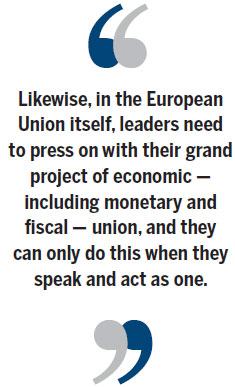A time to act, a time to stick together
Updated: 2015-01-23 10:38
By Fu Jing(China Daily Europe)
|
|||||||||||
European leaders, spooked by economic upheaval and terrorism, need fortitude in facing their problems
For the past two years the rise of China has dominated the agenda of the World Economic Forum when it has held its annual winter meeting in Davos, Switzerland. Before this year's five-day meeting opened on Jan 20, some, by force of habit, were saying things would be no different this time, even if that should certainly not be the case.
Europe, still at risk of going into its third economic recession since 2008, ought to have topped the agenda. That is so irrespective of shocking recent events that have added yet another layer of urgency to the need for European governments to act to ease the fears of their public. Once again the mettle of these leaders is being these severely tested, as happened during the sovereign debt crisis.
The first of these shocking events, on Jan 7 and Jan 9, were the killings of 16 people in Paris by Islamic fanatics, followed soon after by raids in Belgium that are said to have headed off terrorist attacks. In a sense, attacks like the Paris ones were almost inevitable in Europe because of high levels of immigration, aggressive foreign policies and the disparity between talk of respecting people's freedom and respecting the cultures of minorities.
Then, on Jan 15, Switzerland's central bank unexpectedly decoupled the country's currency from the euro, causing a collapse of as much as 30 percent in the value of the euro compared with the franc, a huge shift by any measure, and one that will make life difficult for Swiss exporters.
Later still, and linked to the Swiss currency move, reports signaled that on Jan 22 the European Central Bank would finally decide on whether to buy government bonds to increase money supply or to take quantitative easing measures. In the event, the market was expected to respond strongly worldwide, and Beijing had earmarked such a decision as one uncertainty that might affect its economy.
Still to come were elections in Greece on Jan 25 that, polls were suggesting, the far-left Syriza might win. Such an outcome, which would be likely to intensify debate on whether Greece should quit the eurozone, was likely to rattle financial markets and shake business confidence.
The other huge issue that European leaders have to deal with is the tit-for-tat by Europe and Ukraine on sanctions that have undoubtedly damaged both economies. This issue is, of course, not new, and an amicable solution seems as elusive as ever.
Any one of these events is momentous enough to shake the most robust of economies. A series of them delivers what amount to wake-up calls to Europe and its leaders, and if they react in the right way they can turn these events to good account.
But what the continent's leaders need above all is courage, fleetness of foot, savvy and teamwork.
In practical terms the continent needs an all-out effort to ensure security and safety. Before the Paris attacks, the City of Light was notorious for its darker side - one in which the fear of being robbed is a constant companion for anyone venturing out onto its streets. That is not to say that tourists do not love the city and all it has to offer. Many feel the same way, mixed with the same anxieties, about other top European tourist destinations such as Barcelona, London and Rome. Unfortunately for Paris, it is the one that now faces the biggest challenge in proving to tourists that it is a safe place to go.
More broadly, the world's leaders cannot leave it to their counterparts in Europe and in other countries to protect the world from terrorism and economic shocks. That is a joint enterprise that can only be successful when all governments worldwide act together.
Likewise, in the European Union itself, leaders need to press on with their grand project of economic - including monetary and fiscal - union, and they can only do this when they speak and act as one.
They also need to press on with political reform and lessen the economic and market uncertainties resulting from politicking and electioneering in each of the member states.
EU exporters are now reaping the benefits of a weaker euro, but that in turn is likely to draw complaints from Chinese exporters who are feeling the pinch as a result of the appreciating renminbi.
On the face of it, the euro's fall is heaven-sent news for Chinese shoppers eyeing bargains in the likes of Paris or Milan, and even those wanting to buy properties or looking for somewhere to give their children a fine education. But with Europe's current state, such attractions may not look so attractive after all.
The author is China Daily chief correspondent in Brussels. Contact the writer at fujing@chinadaily.com.cn


(China Daily European Weekly 01/23/2015 page11)
Today's Top News
China offers Swiss $8b quota for yuan trading
Best team China in decade carries countrymen's hope
Russia says DPRK sent positive signal on Kim visit in May
Australia PM quashes rumours of unrest as 'nonsense'
China aims for stronger links with fragile Europe
China to instill national characteristics in think tanks
Shanghai govt releases report on stampede tragedy
Fake condoms, Viagra, seized and online network shut down
Hot Topics
Lunar probe , China growth forecasts, Emission rules get tougher, China seen through 'colored lens', International board,
Editor's Picks

|

|

|

|

|

|





